- Home
- Shirley Jackson
We Have Always Lived in the Castle Page 12
We Have Always Lived in the Castle Read online
Page 12
“Yes,” Constance said with relief, “I should start lunch.” As though she were happy to be doing it at last she came to the table to brush away the dirt and leaves that Charles had left there. She brushed them into a paper bag and threw the bag into the wastebasket, and then she came back with a cloth and scrubbed the table. Charles looked at her and at me and at Uncle Julian. He was clearly baffled, unable to grasp his fingers tightly around anything he saw or heard; it was a joyful sight, to see the first twistings and turnings of the demon caught, and I was very proud of Uncle Julian. Constance smiled down at Charles, happy that no one was shouting any more; she was not going to cry now and perhaps she too was getting a quick glimpse of a straining demon because she said, “You look tired, Charles. Go and rest till lunch.”
“Go and rest where?” he said and he was still angry. “I am not going to stir out of here until something is done about that girl.”
“Merricat? Why should anything be done? I said I would clean your room.”
“Aren’t you even going to punish her?”
“Punish me?” I was standing then, shivering against the door frame. “Punish me? You mean send me to bed without my dinner?”
And I ran. I ran until I was in the field of grass, in the very center where it was safe, and I sat there, the grass taller than my head and hiding me. Jonas found me, and we sat there together where no one could ever see us.
After a very long time I stood up again because I knew where I was going. I was going to the summerhouse. I had not been near the summerhouse for six years, but Charles had blackened the world and only the summerhouse would do. Jonas would not follow me; he disliked the summerhouse and when he saw me turning onto the overgrown path which led there he went another way as though he had something important to do and would meet me somewhere later. No one had ever liked the summerhouse very much, I remembered. Our father had planned it and had intended to lead the creek near it and build a tiny waterfall, but something had gotten into the wood and stone and paint when the summerhouse was built and made it bad. Our mother had once seen a rat in the doorway looking in and nothing after that could persuade her there again, and where our mother did not go, no one else went.
I had never buried anything around here. The ground was black and wet and nothing buried would have been quite comfortable. The trees pressed too closely against the sides of the summerhouse, and breathed heavily on its roof, and the poor flowers planted here once had either died or grown into huge tasteless wild things. When I stood near the summerhouse and looked at it I thought it the ugliest place I had ever seen; I remembered that our mother had quite seriously asked to have it burned down.
Inside was all wet and dark. I disliked sitting on the stone floor but there was no other place; once, I recalled, there had been chairs here and perhaps even a low table but these were gone now, carried off or rotted away. I sat on the floor and placed all of them correctly in my mind, in the circle around the dining-room table. Our father sat at the head. Our mother sat at the foot. Uncle Julian sat on one hand of our mother, and our brother Thomas on the other; beside my father sat our Aunt Dorothy and Constance. I sat between Constance and Uncle Julian, in my rightful, my own and proper, place at the table. Slowly I began to listen to them talking.
“—to buy a book for Mary Katherine. Lucy, should not Mary Katherine have a new book?”
“Mary Katherine should have anything she wants, my dear. Our most loved daughter must have anything she likes.”
“Constance, your sister lacks butter. Pass it to her at once, please.”
“Mary Katherine, we love you.”
“You must never be punished. Lucy, you are to see to it that our most loved daughter Mary Katherine is never punished.”
“Mary Katherine would never allow herself to do anything wrong; there is never any need to punish her.”
“I have heard, Lucy, of disobedient children being sent to their beds without dinner as a punishment. That must not be permitted with our Mary Katherine.”
“I quite agree, my dear. Mary Katherine must never be punished. Must never be sent to bed without her dinner. Mary Katherine will never allow herself to do anything inviting punishment.”
“Our beloved, our dearest Mary Katherine must be guarded and cherished. Thomas, give your sister your dinner; she would like more to eat.”
“Dorothy—Julian. Rise when our beloved daughter rises.”
“Bow all your heads to our adored Mary Katherine.”
8
I had to go back for dinner; it was vital that I sit at the dinner table with Constance and Uncle Julian and Charles. It was unthinkable that they should sit there, eating their dinner and talking and passing food to one another, and see my place empty. As Jonas and I came along the path and through the garden in the gathering darkness I looked at the house with all the richness of love I contained; it was a good house, and soon it would be cleaned and fair again. I stopped for a minute, looking, and Jonas brushed my leg and spoke softly, in curiosity.
“I’m looking at our house,” I told him and he stood quietly beside me, looking up with me. The roof pointed firmly against the sky, and the walls met one another compactly, and the windows shone darkly; it was a good house, and nearly clean. There was light from the kitchen window and from the windows of the dining room; it was time for their dinner and I must be there. I wanted to be inside the house, with the door shut behind me.
When I opened the kitchen door to go inside I could feel at once that the house still held anger, and I wondered that anyone could keep one emotion so long; I could hear his voice clearly from the kitchen, going on and on.
“—must be done about her,” he was saying, “things simply cannot continue like this.”
Poor Constance, I thought, having to listen and listen and watch the food getting cold. Jonas ran ahead of me into the dining room, and Constance said, “Here she is.”
I sood in the dining-room doorway and looked carefully for a minute. Constance was wearing pink, and her hair was combed back nicely; she smiled at me when I looked at her, and I knew she was tired of listening. Uncle Julian’s wheel chair was pushed up tight against the table and I was sorry to see that Constance had tucked his napkin under his chin; it was too bad that Uncle Julian should not be allowed to eat freely. He was eating meat loaf, and peas which Constance had preserved one fragrant summer day; Constance had cut the meat loaf into small pieces and Uncle Julian mashed meat loaf and peas with the back of his spoon and stirred them before trying to get them into his mouth. He was not listening, but the voice went on and on.
“So you decided to come back again, did you? And high time, too, young lady; your sister and I have been trying to decide how to teach you a lesson.”
“Wash your face, Merricat,” Constance said gently. “And comb your hair; we do not want you untidy at table, and your Cousin Charles is already angry with you.”
Charles pointed his fork at me. “I may as well tell you, Mary, that your tricks are over for good. Your sister and I have decided that we have had just exactly enough of hiding and destroying and temper.”
I disliked having a fork pointed at me and I disliked the sound of the voice never stopping; I wished he would put food on the fork and put it into his mouth and strangle himself.
“Run along, Merricat,” Constance said, “your dinner will be cold.” She knew I would not eat dinner sitting at that table and she would bring me my dinner in the kitchen afterwards, but I thought that she did not want to remind Charles of that and so give him one more thing to talk about. I smiled at her and went into the hall, with the voice still talking behind me. There had not been this many words sounded in our house for a long time, and it was going to take a while to clean them out. I walked heavily going up the stairs so they could hear that I was surely going up, but when I reached the top I went as softly as Jonas behind me.
Constance had cleaned the room where he was living. It looked very empty, because all she had done was take
things out; she had nothing to put back because I had carried all of it to the attic. I knew the dresser drawers were empty, and the closet, and the bookshelves. There was no mirror, and a broken watch and a smashed chain lay alone on the dresser top. Constance had taken away the wet bedding, and I supposed she had dried and turned the mattress, because the bed was made up again. The long curtains were gone, perhaps to be washed. He had been lying on the bed, because it was disarranged, and his pipe, still burning, lay on the table beside the bed; I supposed that he had been lying here when Constance called him to dinner, and I wondered if he had looked around and around the altered room, trying to find something familiar, hoping that perhaps the angle of the closet door or the light on the ceiling would bring everything back to him again. I was sorry that Constance had to turn the mattress alone; usually I helped her but perhaps he had come and offered to do it for her. She had even brought him a clean saucer for his pipe; our house did not have ashtrays and when he kept trying to find places to put down his pipe Constance had brought a set of chipped saucers from the pantry shelf and given them to him to hold his pipe. The saucers were pink, with gold leaves around the rim; they were from a set older than any I remembered.
“Who used them?” I asked Constance, when she brought them into the kitchen. “Where are their cups?”
“I’ve never seen them used; they come from a time before I was in the kitchen. Some great-grandmother brought them with her dowry and they were used and broken and replaced and finally put away on the top shelf of the pantry; there are only these saucers and three dinner plates.”
“They belong in the pantry,” I said. “Not put around the house.”
Constance had given them to Charles and now they were scattered, instead of spending their little time decently put away on a shelf. There was one in the drawing room and one in the dining room and one, I supposed, in the study. They were not fragile, because the one now in the bedroom had not cracked although the pipe on it was burning. I had known all day that I would find something here; I brushed the saucer and the pipe off the table into the wastebasket and they fell softly onto the newspapers he had brought into the house.
I was wondering about my eyes; one of my eyes—the left—saw everything golden and yellow and orange, and the other eye saw shades of blue and grey and green; perhaps one eye was for daylight and the other was for night. If everyone in the world saw different colors from different eyes there might be a great many new colors still to be invented. I had reached the staircase to go downstairs before I remembered and had to go back to wash, and comb my hair. “What took you so long?” he asked when I sat down at the table. “What have you been doing up there?”
“Will you make me a cake with pink frosting?” I asked Constance. “With little gold leaves around the edge? Jonas and I are going to have a party.”
“Perhaps tomorrow,” Constance said.
“We are going to have a long talk after dinner,” Charles said.
“Solanum dulcamara,” I told him.
“What?” he said.
“Deadly nightshade,” Constance said. “Charles, please let it wait.”
“I’ve had enough,” he said.
“Constance?”
“Yes, Uncle Julian?”
“I have cleaned my plate.” Uncle Julian found a morsel of meat loaf on his napkin and put it into his mouth. “What do I have now?”
“Perhaps a little more, Uncle Julian? It is a pleasure to see you so hungry.”
“I feel considerably better tonight. I have not felt so hearty for days.”
I was pleased that Uncle Julian was well and I knew he was happy because he had been so discourteous to Charles. While Constance was cutting up another small piece of meat loaf Uncle Julian looked at Charles with an evil shine in his old eyes, and I knew he was going to say something wicked. “Young man,” he began at last, but Charles turned his head suddenly to look into the hall.
“I smell smoke,” Charles said.
Constance paused and lifted her head and turned to the kitchen door. “The stove?” she said and got up quickly to go into the kitchen.
“Young man—”
“There is certainly smoke.” Charles went to look into the hall. “I smell it out here,” he said. I wondered whom he thought he was talking to; Constance was in the kitchen and Uncle Julian was thinking about what he was going to say, and I had stopped listening. “There is smoke,” Charles said.
“It’s not the stove.” Constance stood in the kitchen doorway and looked at Charles.
Charles turned and came closer to me. “If this is anything you’ve done . . .” he said.
I laughed because it was clear that Charles was afraid to go upstairs and follow the smoke; then Constance said, “Charles—your pipe—” and he turned and ran up the stairs. “I’ve asked him and asked him,” Constance said.
“Would it start a fire?” I asked her, and then Charles screamed from upstairs, screamed, I thought, with the exact sound of a bluejay in the woods. “That’s Charles,” I said politely to Constance, and she hurried to go into the hall and look up. “What is it?” she asked, “Charles, what is it?”
“Fire,” Charles said, crashing down the stairs, “Run, run; the whole damn house is on fire,” he screamed into Constance’s face, “and you haven’t got a phone.”
“My papers,” Uncle Julian said. “I shall collect my papers and remove them to a place of safety.” He pushed against the edge of the table to move his chair away. “Constance?”
“Run,” Charles said, at the front door now, wrenching at the lock, “run, you fool.”
“I have not done much running in the past few years, young man. I see no cause for this hysteria; there is time to gather my papers.”
Charles had the front door open now, and turned on the doorsill to call to Constance. “Don’t try to carry the safe,” he said, “put the money in a bag. I’ll be back as fast as I can get help. Don’t panic.” He ran, and we could hear him screaming “Fire! Fire! Fire!” as he ran toward the village.
“Good heavens,” Constance said, almost amused. Then she took Uncle Julian’s chair to help him into his room and I went into the hall and looked upstairs. Charles had left the door to our father’s room standing open and I could see the movement of fire inside. Fire burns upward, I thought; it will burn their things in the attic. Charles had left the front door open too, and a line of smoke reached down the stairs and drifted outside. I did not see any need to move quickly or to run shrieking around the house because the fire did not seem to be hurrying itself. I wondered if I could go up the stairs and shut the door to our father’s room and keep the fire inside, belonging entirely to Charles, but when I started up the stairs I saw a finger of flame reach out to touch the hall carpet and some heavy object fell crashing in our father’s room. There would be nothing of Charles in there now; even his pipe must have been consumed.
“Uncle Julian is gathering his papers,” Constance said, coming into the hall to stand beside me. She had Uncle Julian’s shawl over her arm.
“We will have to go outside,” I said. I knew that she was frightened, so I said, “We can stay on the porch, behind the vines, in the darkness.”
“We neatened it just the other day,” she said. “It has no right to burn.” She began to shiver as though she were angry, and I took her by the hand and brought her through the open front door and just as we turned back for another look the lights came into the driveway with the disgusting noise of sirens and we were held in the doorway in the light. Constance put her face against me to hide, and then there was Jim Donell, the first one to leap from the fire engine and run up the steps. “Out of the way,” he said, and pushed past us and into our house. I took Constance along the porch to the corner where the vines grew thick, and she moved into the corner and pressed against the vines. I held her hand tight, and together we watched the great feet of the men stepping across our doorsill, dragging their hoses, bringing filth and confusion and danger into our
house. More lights moved into the driveway and up to the steps, and the front of the house was white and pale and uncomfortable at being so clearly visible; it had never been lighted before. The noise was too much for me to hear all together, but somewhere in the noise was Charles’ voice, still going on and on. “Get the safe in the study,” he said a thousand times.
Smoke squeezed out the front door, coming between the big men pushing in. “Constance,” I whispered, “Constance, don’t watch them.”
“Can they see me?” she whispered back. “Is anyone looking?”
“They’re all watching the fire. Be very quiet.”
I looked carefully out between the vines. There was a long row of cars, and the village fire engine, all parked as close to the house as they could get, and everyone in the village was there, looking up and watching. I saw faces laughing, and faces that looked frightened, and then someone called out, very near to us, “What about the women, and the old man? Anyone see them?”
“They had plenty of warning,” Charles shouted from somewhere, “they’re all right.”
Uncle Julian could manage his chair well enough to get out the back door, I thought, but it did not seem that the fire was going near the kitchen or Uncle Julian’s room; I could see the hoses and hear the men shouting, and they were all on the stairs and in the front bedrooms upstairs. I could not get through the front door, and even if I could leave Constance there was no way to go around to the back door without going down the steps in the light with all of them watching. “Was Uncle Julian frightened?” I whispered to Constance.
“I think he was annoyed,” she said. A few minutes later she said, “It will take a great deal of scrubbing to get that hall clean again,” and sighed. I was pleased that she thought of the house and forgot the people outside.
“Jonas?” I said to her; “where is he?”
I could see her smile a little in the darkness of the vines. “He was annoyed, too,” she said. “He went out the back door when I took Uncle Julian in to get his papers.”

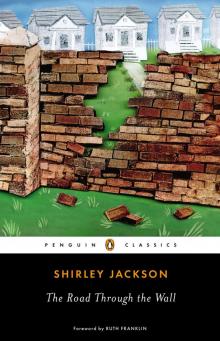 The Road Through the Wall
The Road Through the Wall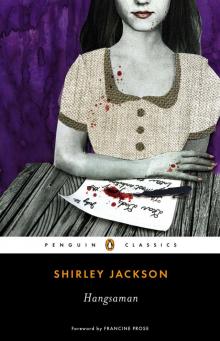 Hangsaman
Hangsaman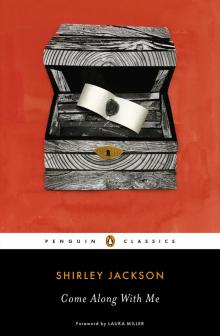 Come Along With Me
Come Along With Me The Lottery
The Lottery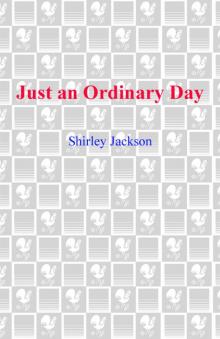 Just an Ordinary Day: Stories
Just an Ordinary Day: Stories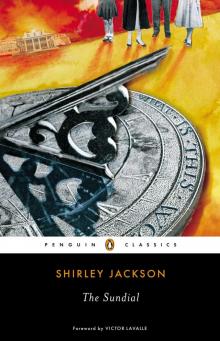 The Sundial
The Sundial Dark Tales
Dark Tales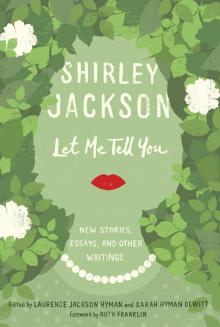 Let Me Tell You: New Stories, Essays, and Other Writings
Let Me Tell You: New Stories, Essays, and Other Writings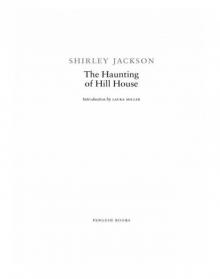 The Haunting of Hill House
The Haunting of Hill House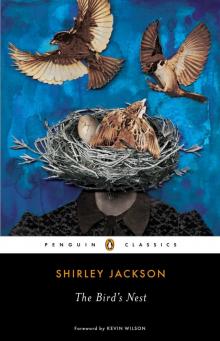 The Bird's Nest
The Bird's Nest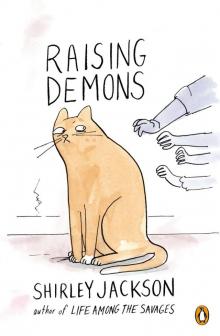 Raising Demons
Raising Demons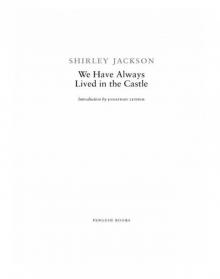 We Have Always Lived in the Castle
We Have Always Lived in the Castle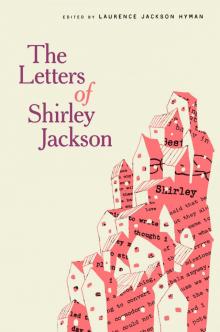 The Letters of Shirley Jackson
The Letters of Shirley Jackson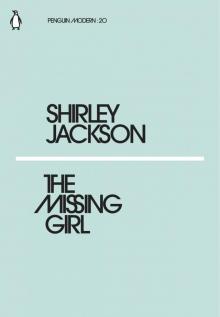 The Missing Girl
The Missing Girl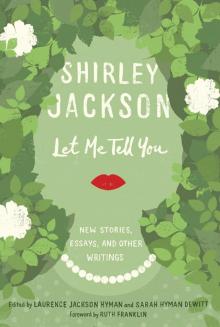 Let Me Tell You
Let Me Tell You